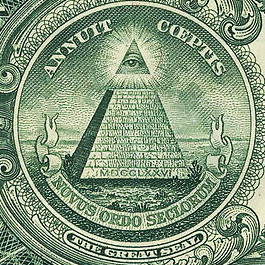Home > Articles > Annuit Coeptis Meaning?
"E Pluribus Unum" ("out of many, one") and "In God We Trust" may get the most attention, but one phrase, "Annuit Coeptis," also holds vital importance to the Great Seal of the United.
What Does Annuit Coeptis Mean?

Annuit Coeptis As Seen On $1 Reverse
"Annuit Coeptis" (or "Annuit cœptis") can be translated several ways. The official translation, as given by the U.S. State Department, U.S. Mint, and U.S. Treasury, is "He (God) has favored our undertakings." Other translations include "[He/She/It] favors our undertakings" or if using a painfully incorrect translation through a service like Google Translate, "Signals Enterprise."
Individually, the words mean:
Annuit: "wink," "nod," or "approve"
Coeptis: "commencement," "undertaking," or "work"
Taken together, we get the understanding of the official meaning as applied by the U.S. federal government.
Why is Annuit Coeptis on the Great Seal?
The term "Annuit Coeptis" was not the first phrase in its place on the Great Seal. In 1782, Congress commissioned Thomas Barton of Philadelphia to create a seal for the new country. Barton’s seal contained most of the now-iconic imagery and words, including the pyramid and the Eye of Providence. However, around these symbols on the reverse side, Barton suggested "Deo Favente," meaning "with God’s favor" and "Perennis," or "Everlasting."
These terms were later dropped in the final version of the Great Seal by Charles Thomson, who suggested "Annuit Coeptis" to align the top, and "Novus Ordo Seclorum" (translated to "a new order for the ages").
One researcher, Robert Hieronimus, suggested that the change from "Deo Favente" to "Annuit Coeptis" was to match with the theme of thirteen that exists on the seal in other places. That matching includes the 13 rows on the pyramid, 13 olives, 13 olive leaves, and 13 letters in "E Pluribus Unum").
What Does the Symbolism In Annuit Coeptis Mean?
The Founding Fathers placed a lot of trust in the symbolism of the Great Seal. All aspects surround the belief that the United States was developed by divine providence, or "the foreseeing care and guidance of God or nature." In this case, God takes precedence as the divine being overseeing America’s creation and success. In the phrase "Annuit Coeptis" the "He" or "God" is taken more as more generally theistic than specifically relating to a specific religion, although verifiably referring to the deity associated with Jewish and Christian tradition. Although the Found Fathers were primarily Christian of varying sorts, many were known to be Deists, or individuals who believe in a creator, but not one that directly influences human events.


